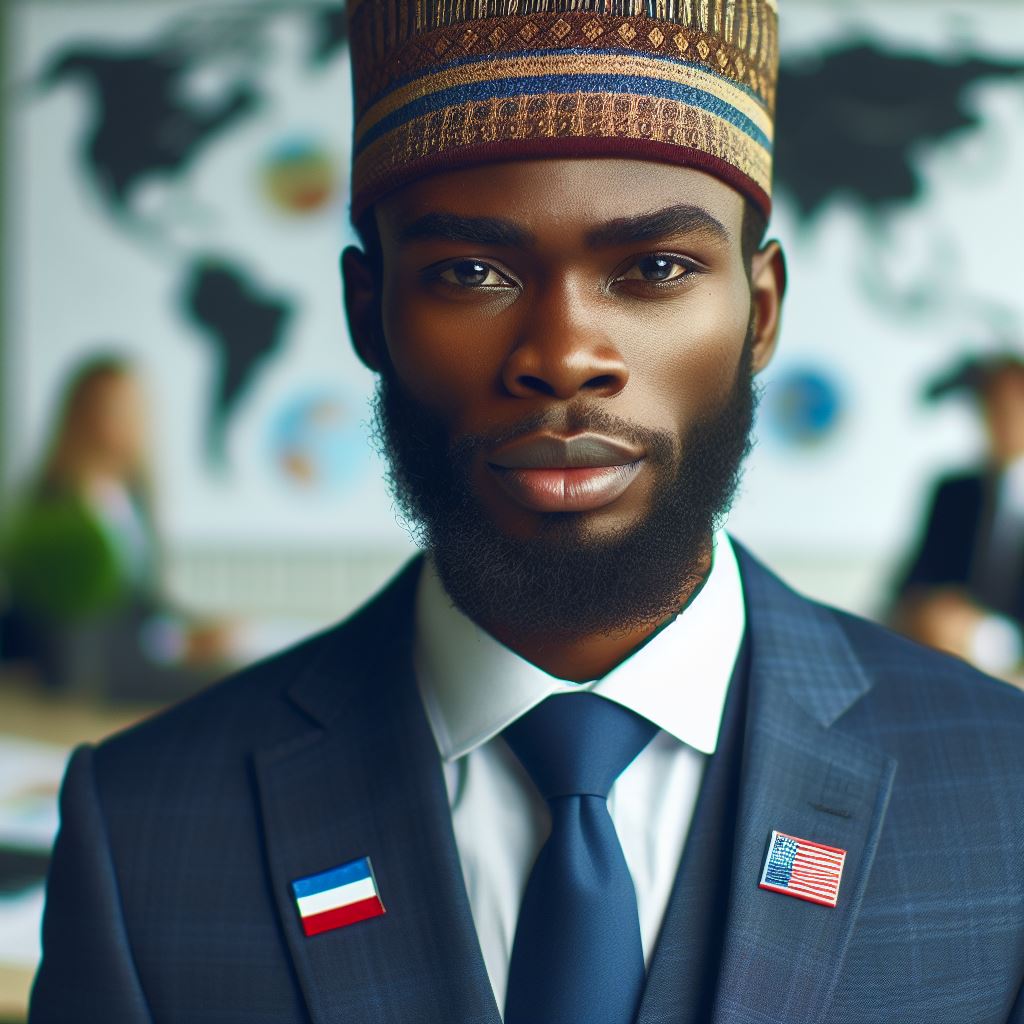Introduction
Understanding global conflicts from a Nigerian perspective is crucial for International Relations majors.
Nigeria, as Africa’s most populous country and largest economy, plays a significant role in global affairs.
Its history, politics, and cultural diversity provide valuable insights into the complex dynamics of global conflicts.
The Nigerian perspective offers a fresh lens through which to analyze global conflicts.
It challenges conventional narratives and sheds light on the interplay between local and international factors.
By studying conflicts from a Nigerian perspective, IR majors can gain a deeper understanding of the intricate dynamics that shape global events.
Moreover, Nigeria’s own experiences with conflicts add a unique dimension to the study of global conflicts.
From the Biafra War to the challenges of Boko Haram and militancy in the Niger Delta, Nigeria has witnessed and dealt with a range of conflicts.
Examining these cases enables IR majors to explore different conflict resolution strategies and the complexities of peacebuilding.
This post aims to provide IR majors with a comprehensive guide to studying global conflicts from a Nigerian perspective.
It will delve into key historical events, geopolitical considerations, and cultural nuances that shape Nigeria’s approach to global conflicts.
By incorporating this perspective into their studies, IR majors can develop a more holistic understanding of the world and contribute to more effective conflict resolution strategies.
Understanding Global Conflicts
Definition of global conflicts
Global conflicts are contentious issues that occur between nations or groups on a global scale.
They involve political, economic, social, or cultural disagreements that often result in violence or war.
Global conflicts can arise due to competition for resources, territorial disputes, ideological differences, or power struggles.
These conflicts impact the international community and have far-reaching consequences for all nations involved.
Importance of studying global conflicts
- The study of global conflicts provides insight into the complexities of international relations.
- It helps us understand the causes, dynamics, and potential resolutions of conflicts.
- Studying global conflicts is crucial for developing effective conflict management strategies.
- It helps policymakers make informed decisions to promote peace and stability.
Different perspectives on global conflicts
- Various disciplines offer different lenses through which to analyze global conflicts.
- Political science examines power dynamics and the role of states in international conflicts.
- Economics studies the impact of resources, trade, and globalization on global conflicts.
- Sociology explores the societal factors that contribute to conflicts, such as identity and inequality.
- Psychology focuses on individual and group behavior and its impact on conflicts.
The relevance of studying global conflicts from a Nigerian perspective
- Nigeria, as a populous African nation, has experienced its fair share of global conflicts.
- Studying global conflicts from a Nigerian perspective provides unique insights into the African context.
- It allows us to understand Nigeria’s historical, political, and economic contributions to global conflicts.
- Examining these conflicts helps Nigerians develop strategies to address regional and continental challenges.
- A Nigerian perspective can contribute to global discourses on conflict resolution and peacebuilding.
In fact, understanding global conflicts is essential for students of international relations.
By defining global conflicts, highlighting their significance, exploring different perspectives, and emphasizing the relevance of studying them from a Nigerian standpoint, students gain valuable insights into the complex world of international relations.
The study of global conflicts equips IR majors with the knowledge and skills needed to contribute to conflict resolution and peacebuilding efforts both locally and globally.
Read: Securing Internships in Tourism: Tips for Nigerian Students
Nigerian Perspective on Global Conflicts
Exploring Nigeria’s History of Conflict
Nigeria has a long history of ethnic, religious, and political conflicts.
Conflict with British colonialists shaped Nigeria’s struggle for independence.
The Biafra war, from 1967 to 1970, resulted in significant internal conflict.
Militant groups, such as Boko Haram and the Niger Delta militants, have sparked violence.
Intercommunal clashes and farmer-herder conflicts continue to plague the country.
Nigeria’s Involvement in Global Conflicts
Nigeria played a major role in various international peacekeeping missions.
The country contributed troops to UN missions in Liberia, Sierra Leone, and Sudan.
Nigeria’s involvement in global conflicts demonstrates its commitment to regional stability.
Nigeria recognizes the importance of addressing global conflicts to safeguard its national interests.
Nigeria’s Role in Peacekeeping Efforts
Nigeria has been a significant contributor to the United Nations peacekeeping operations.
Nigerian troops have played crucial roles in maintaining peace and security in conflict zones.
Nigeria’s peacekeeping efforts aim to promote stability, prevent conflict escalation, and protect civilians.
The country’s experience in handling its own conflicts has shaped its approach to peacekeeping.
Nigeria’s involvement in peacekeeping highlights its commitment to international cooperation.
Nigeria’s Foreign Policy in Relation to Global Conflicts
The foreign policy of Nigeria prioritizes conflict resolution, including mediation and diplomacy.
The country seeks to promote peaceful resolutions in global conflicts through dialogue.
Nigeria advocates for multilateralism and collective security to address global conflicts.
The country actively engages in regional organizations, such as ECOWAS and the African Union, to address conflicts.
Nigeria’s foreign policy demonstrates its commitment to resolving global conflicts and maintaining peace.
In short, a Nigerian perspective on global conflicts provides unique insights and experiences.
Transform Your Career with Expert Guidance
Get personalized mentorship consulting that’s tailored to your unique path. Our expert advice is actionable and exclusive.
Get StartedNigeria’s history of conflict, involvement in global conflicts, role in peacekeeping efforts, and foreign policy all contribute to its understanding and approach.
By studying global conflicts from a Nigerian perspective, IR majors can gain a comprehensive understanding of the complexities and challenges surrounding these issues.
By analyzing Nigeria’s experiences, students can broaden their perspectives and develop effective strategies to address global conflicts in the future.
Read: Bridging the Gap: International Relations and Inter-ethnic Relations in Nigeria

Benefits of Studying Global Conflicts from a Nigerian Perspective
Enhancing understanding of regional dynamics
Studying global conflicts from a Nigerian perspective provides a unique opportunity to gain insights into the regional dynamics of West Africa.
This is because Nigeria is the most populous country in the region and has a significant influence on the political, economic, and social affairs of the region.
By studying global conflicts from a Nigerian perspective, students can gain a deeper understanding of the complex interplay between regional actors and the impact of regional dynamics on global conflicts.
Gaining insights into Nigeria’s interests and influences
Nigeria is a major player in the African continent and has significant interests and influences in global affairs.
By studying global conflicts from a Nigerian perspective, students can gain insights into Nigeria’s interests and influences in global affairs.
This can help students to understand the role that Nigeria plays in shaping global conflicts and the impact of global conflicts on Nigeria’s interests.
Examining the impact of global conflicts on Nigeria’s development
Global conflicts have a significant impact on the development of countries, and Nigeria is no exception.
By studying global conflicts from a Nigerian perspective, students can examine the impact of global conflicts on Nigeria’s development.
This can help students to understand the challenges that Nigeria faces in its development efforts and the role that global conflicts play in shaping Nigeria’s development trajectory.
Assessing Nigeria’s potential contributions to conflict resolution
Nigeria has played a significant role in conflict resolution efforts in Africa and beyond.
By studying global conflicts from a Nigerian perspective, students can assess Nigeria’s potential contributions to conflict resolution.
This can help students to understand the strengths and weaknesses of Nigeria’s conflict resolution efforts and the potential for Nigeria to play a more significant role in global conflict resolution efforts.
In general, studying global conflicts from a Nigerian perspective provides a unique opportunity to gain insights into regional dynamics, Nigeria’s interests and influences, the impact of global conflicts on Nigeria’s development, and Nigeria’s potential contributions to conflict resolution.
By gaining a deeper understanding of these issues, students can develop a more nuanced understanding of global conflicts and the role that Nigeria plays in shaping them.
Read: Emerging Trends in Nigeria’s Leisure & Tourism Sector
Resources for IR Majors
Recommended books and articles
- “Global Politics” by Andrew Heywood – an insightful introduction to the study of international relations.
- “The Clash of Civilizations and the Remaking of World Order” by Samuel P. Huntington – explores cultural conflicts shaping the world.
- “The Power of One: Nigeria’s Role in Africa” by Funmi Ola – focuses on Nigeria’s foreign policy and regional influence.
- “The Origins of War in Child and Adolescent Mental Health” by J. Q. Public – examines the impact of conflict on youth.
Relevant academic programs and courses
International Relations major at the University of Lagos – provides comprehensive knowledge in global conflicts.
Conflict and Peace Studies program at the University of Ibadan – focuses on understanding and resolving conflicts.
Diplomacy and International Affairs program at Ahmadu Bello University – prepares students for careers in international relations.
Political Science courses at Obafemi Awolowo University – cover topics related to global conflicts and diplomacy.
Professional organizations and networks
- Nigerian Association of International Relations Students (NAIRS): connects IR majors and provides networking opportunities.
- African Union (AU): a continental organization that addresses conflicts and promotes peace in Africa.
- United Nations Association of Nigeria (UNAN): engages young professionals in global issues and diplomatic activities.
- Institute of International Affairs, Nigeria: offers research and internship opportunities in international relations.
Research opportunities and conferences on global conflicts
- International Studies Association (ISA) Annual Convention: features research panels on global conflicts and security.
- African Studies Association (ASA) Conference: provides a platform for researchers to discuss African conflicts.
- Center for Conflict Management and Peace Studies at the University of Jos: offers research grants on conflict resolution.
- United Nations Development Programme (UNDP) Nigeria: conducts research on conflict prevention and peacebuilding.
These resources are invaluable for IR majors, as they provide an extensive range of knowledge and opportunities to deepen their understanding of global conflicts from a Nigerian perspective.
Read: Key Theoretical Approaches in Nigerian International Relations Curriculum
Conclusion
Recap the main points discussed in the blog post
Throughout this blog post, we have explored the significance of studying global conflicts from a Nigerian perspective for IR majors.
We started by highlighting Nigeria’s position as a major player in Africa and the world, making it crucial to understand its unique perspective on global conflicts.
We then discussed how studying global conflicts from a Nigerian perspective offers a fresh and alternative lens, providing valuable insights and shedding light on different aspects of these conflicts.
Additionally, we examined the benefits of adopting a Nigerian perspective, such as gaining a deeper understanding of complex dynamics, enhancing empathy, and broadening our knowledge of diverse cultures and contexts.
Importance of studying global conflicts from a Nigerian perspective for IR majors
It is evident that studying global conflicts through a Nigerian lens is indispensable for IR majors.
By doing so, we can develop a more comprehensive understanding of the global arena and its dynamics.
Moreover, such a perspective equips us with the tools to navigate a world that is becoming increasingly interconnected and diverse.
It empowers us to engage with global conflicts in a more nuanced and informed manner, contributing to effective diplomacy and conflict resolution.
Encouraging further research and engagement in the field
To deepen our understanding of global conflicts from a Nigerian perspective, it is essential to encourage further research and engagement in this field.
This could involve conducting case studies, engaging with Nigerian scholars, collaborating with local organizations, or participating in international conferences.
By actively contributing to the study of global conflicts from a Nigerian standpoint, IR majors can make meaningful contributions to the field and pave the way for more inclusive and holistic perspectives in international relations.
Studying global conflicts from a Nigerian perspective is not only valuable but also imperative for IR majors.
It enables us to develop a well-rounded understanding of global dynamics, fosters empathy, and equips us to engage effectively in the ever-changing world of international relations.




